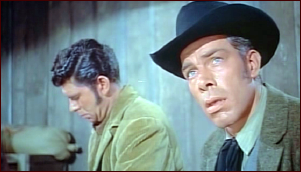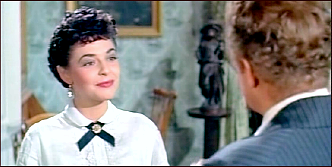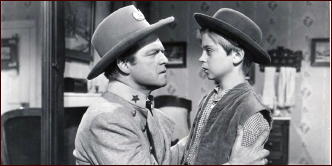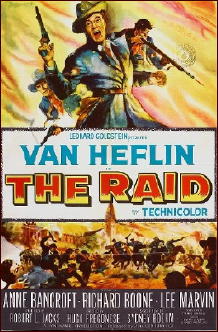Thu 17 Jul 2014
A Movie Review by Jonathan Lewis: THE RAID (1954).
Posted by Steve under Reviews , War Films[8] Comments
THE RAID. 20th Century Fox, 1954. Van Heflin, Anne Bancroft, Richard Boone, Lee Marvin, Tommy Rettig, Peter Graves, Will Wright, James Best. Director: Hugo Fregonese.
Every once and a while, I happen upon a movie from the 1950s that doesn’t have much of a critical reputation, but is both well made, and eminently watchable. That’s the case with the action/quasi-Western film, The Raid, starring Van Heflin, Anne Bancroft, Richard Boone, and Lee Marvin.
Loosely based on a Confederate raid on, and bank heist in the border town of St. Albans, Vermont, in October 1864 (you can read more about the actual historical events and timeline here), The Raid benefits from a strong cast capable of solid acting, a screenplay bereft of the type of sentimentality that ruins far too many historical dramas, and superb, crisp cinematography by Lucien Ballard, known by Western fans for his work in The Wild Bunch. The choreographed fight scenes, while by no means similar to those in the better-known epic films, are nevertheless quite well constructed.
The movie begins with a good old-fashioned jailbreak. Confederate soldiers, under the command of Major Neal Benton (Van Heflin), break out of a Union prison located close to the Canadian border. Among the men in their ranks is the hotheaded Lt. Keating (Lee Marvin), who you just know is going to cause problems as the story moves forward. The men make their way to neutral Canada and from there put in motion an ambitious plot to raid Union towns on the other side of the border. Among the conspirators is Lt. Robinson, memorably portrayed by James Best.
St. Albans, Vermont is the first target. Benton (Van Heflin) arrives in town, pretending to be a businessman named Neal Swayze. He finds lodging in a boardinghouse run by war widow Katie Bishop (Anne Bancroft) who lives there with her son, Larry (Tommy Rettig). Among the other boarders is a wounded Union soldier, Captain Lionel Foster (Richard Boone), a man with a burdensome secret that haunts his present.
The majority of the movie follows Benton as he interacts with fervently pro-Union members townsfolk, all the while plotting against the small Vermont city. Along the way, he develops a quasi-romantic attachment to the lovely Katie and some fatherly affection toward her son. When Benton stops a violently drunk Keating (Marvin) from shooting innocent people, he inadvertently becomes the town hero. Needless to say, this puts him in an awkward position, as his fellow Confederates, including Captain Frank Dwyer (Peter Graves in a not particularly memorable performance) are ready for action.
The Raid culminates in a fairly violent sequence in which Benton and his men raid the town, rob a bank, and burn down numerous establishments. Former Union officer Foster (Boone) attempts to stop them, in part to make up for his shameful secret. But it’s to no avail. In this film, at least, the South is victorious.
There’s thankfully very little sentimentality here. Benton doesn’t fall madly in love with Katie and abandon his mission. He’s a soldier through and through. There’s something very real about his character, although the scenes in which he is angry upon encountering anti-Confederate sentiment in the town are a bit hard to digest. One would think a spy would be able to hide his true emotions a bit better.
That said, Van Heflin was well cast in this role. He portrays a man conflicted, but one not a man about to abandon his homeland for a fairy tale romance. For his part, Lee Marvin succeeds brilliantly in his portrayal of an alcohol prone Confederate officer more interested in wreaking havoc than in following orders. He’s such a presence that you almost feel bad for the guy when he gets it in the chest. It was a relatively early role for Marvin, but you can see why he was going to have a long career ahead of him.
I’d hesitate to call The Raid a forgotten masterpiece. It’s simply a very good movie, one that has good characters and tells an interesting story. The fact that the film lacks a hero may explain its relative obscurity. It has a protagonist in Benton, but he’s not really a hero. But what if there weren’t any real heroes in the St. Albans raid? Maybe they were just men hundreds of miles from home, swept up in the torrent of a war that they didn’t ask for in the first place. Maybe that’s the whole point.





July 18th, 2014 at 6:59 am
The director Hugo Fregonese is a cult figure among some auteurist film historians. Please see Dan Sallitt’s list of Best Films, where he picks “The Raid” as the best film of 1954:
http://www.panix.com/~sallitt/bestfilm50.html
I haven’t seen much of Hugo Fregonese’s work myself.
Auteurist film history has not really spread far into the public at large. What auteurists know about film history, is often not “known” by the public as a whole, or by university professors or commercial film reviewers. Instead, what auteurists know is often described as “forgotten” or “unknown”.
I’m an auteurist myself.
July 18th, 2014 at 7:06 am
Please see also auteurist Jaime Christley’s list of best films of the 1950’s, which lists The Raid as part of 1954’s Top Tier:
http://thefilmsaurus.com/blog/?p=284
If people read what auteurists wrote, we could have a revolution in public understanding of film history.
Auteurists believe in sharing what they know, for free on the Internet.
It’s all free and easily available to the public.
July 18th, 2014 at 7:13 am
“The Raid” is also notable for its effects in the UK. Philip French, then an undergraduate at Oxford, reviewed it for the undergraduate magazine “Isis” and began a career as a critic which still continues and the playwright John Arden was inspired to write his masterpiece Sarjeant Musgrave’s Dance.
July 18th, 2014 at 11:07 am
Roger,
Thanks for that bit of information. Very interesting.
Mike,
I’m somewhat familiar with auteurist scholarship and the intellectual origins of the movement in France. I happen to agree with auteurists to an extent, particularly when it comes to the films of the 1950s. I happen to be a great admirer of Anthony Mann myself and do appreciate Lang, De Toth, etc. Still, I hadn’t seen these links before and I appreciate your sharing them. I may have to go and watch quite a few of these films in the months ahead
July 18th, 2014 at 11:10 am
I own Hugo Fregonese’s “Man in the Attic” on DVD, but haven’t watched it yet. Putting that on my “to watch” list immediately
July 18th, 2014 at 5:06 pm
Fregonese is an interesting director, certainly obscure to all but auteurist, though I would argue the director cult is greater now than any other time however limited it may be in scope.
The fifties produced a number of autuerist favorites including Delmer Daves, Joseph Lewis, Budd Botticher, John Sturgis, de Toth, Fregonese, Zimmerman, Sam Fuller, and Mann (though many started well before the fifties).
For its time The Raid is an even more unusual film. It treats neither side as particularly noble and while not sympathetic to the South less romantic or antagonistic than most films of the era. The performances are good for the most part, and none of the characters are just stereotypes. Even Marvin’s character is more reckless and hate filled than evil.
It has a protagonist in Heflin, but as pointed out, no heroes. Even though the South wins in this film there is a clear implication that the raid accomplished little in terms of military objectives, and historically it was considered a fluke and drew many fewer Union troops from the front line than was its hope.
It’s a bit like the poetry regarding the Duke of Marlborogh (John Churchill)’s famous victory. No one quite recalls exactly what the point was, but ’twas a famous victory.’
July 18th, 2014 at 5:14 pm
Delmer Daves is an interesting director and someone whose name doesn’t get mentioned all that frequently anymore. His directorial debut I know was with two major stars: Cary Grant and John Garfield in “Destination Tokyo.” This was before he went on to direct thrillers and Westerns.
There’s one character in “The Raid” whom I didn’t mention, but in retrospect is significant: the Black butler who works in the boardinghouse. Upon Van Heflin’s character’s arrival, the butler exhibits a peculiar look on his face. I thought “well he knows something about this guy,” but the storyline was never developed.
August 20th, 2014 at 2:33 am
Jonathan, I’m glad you mentioned the butler. I thought the same thing when he got that look. It was never explained. Also, I also thought it odd that he was so calm when he saw Van Heflin’s character in his Confederate uniform. Other than that it was a well made film.